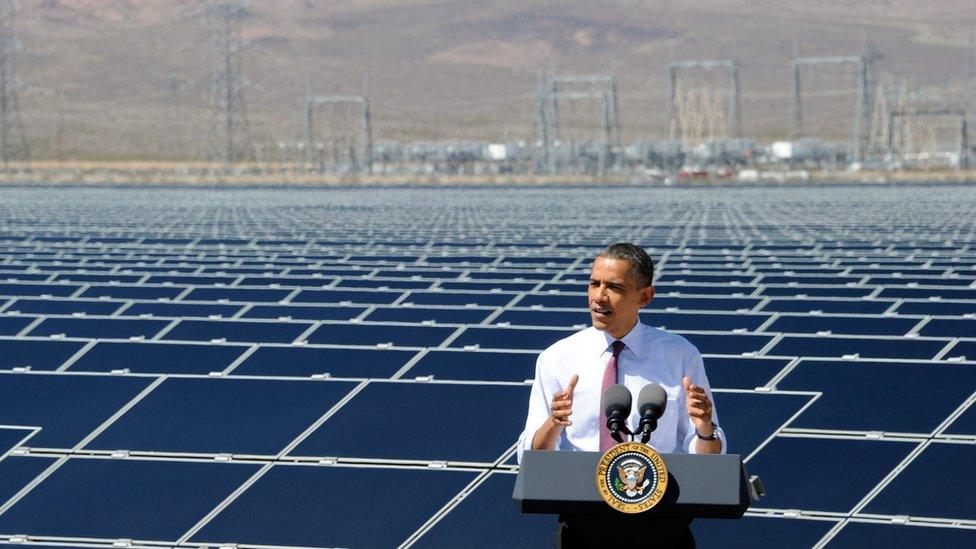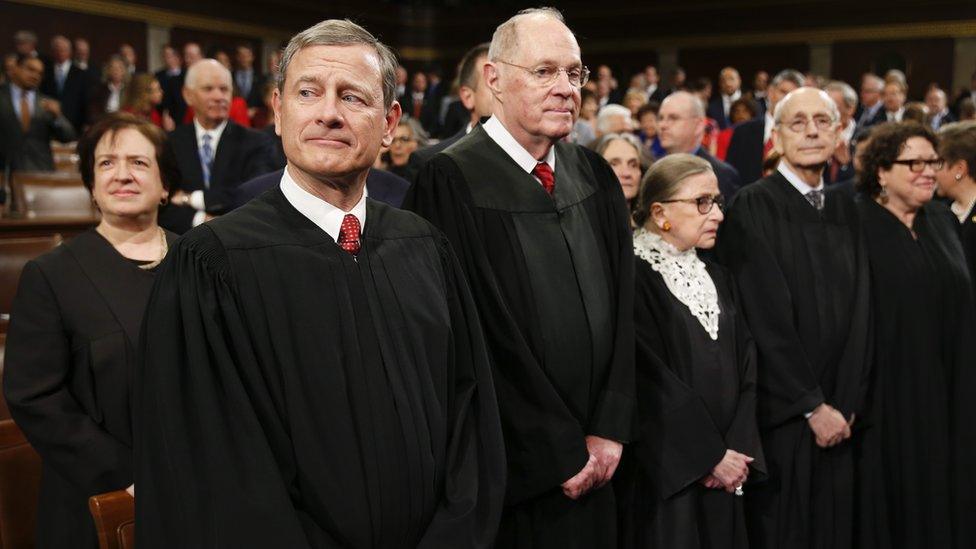Supreme shock: Has US court holed Paris climate deal?
- Published
- comments

President Obama's Clean Power Plan aims to restrict carbon and boost renewable energy
Have five elderly, conservative Americans stalled what President Obama called the "best chance we have to save the one planet we've got", external?
Despite all the noise from those stumping for Trump and feeling the burn for Bernie, the decision by a majority of the nine men and women who make up the US Supreme Court to temporarily halt President Obama's Clean Power Plan, may have significant implications for the world beyond New Hampshire and the other 49 states.
The Supreme Court's decision to issue a stay, external to a coalition of Republican states, coal industry and mining groups came as a massive shock to all sides.
"It is such a nakedly partisan, unprecedented type of action," said Paul Bledsoe, a White House climate adviser under President Clinton.
"It is redolent of this hyper-partisanship that the US is suffering from, and the fact that it has seeped into the most objective branch of government is just remarkable."
Despite the assertion by the White House that this was merely a legal "bump in the road", no one really knows quite how things will now play out.
Deadlines and delays
Those opposed to the Plan argued that it represented a massive overextension of the President's executive authority at the expense of State's rights.
The Supreme Court indicated that they wanted this issue to be resolved legally before the other elements of the Plan could be put into practice.
This is bad news for the Plan on two counts.
It is due to start in 2022, but states were supposed to submit their carbon cutting plans by this September.
That deadline will now be missed as this legal issue is not likely to be resolved before the end of next year.
The second and more important point from Mr Obama's perspective is that by granting the stay, the Supreme Court is hinting strongly it has issues with the whole Plan.
"The stay is a signal that the Supreme Court has serious concerns with the power plan," said Mike Duncan, president of American's for Clean Coal Electricity.
"We're optimistic the power plan will ultimately be rejected."
If that happens it could be bad news for the Paris process.
"It casts an enormous shadow on the commitment's the US made in Paris," said Bruce Huber, a law professor at the University of Notre Dame.

The justices of the US Supreme Court at the recent State of the Union address
"There is an election coming up and there is a possibility that the incoming president wouldn't take the commitment as seriously as President Obama has, this merely adds further cause for concern for those who are worried about climate change."
The question is could the key strength of the Paris agreement become its weakness?
Paris ultimately worked because countries could decide for themselves how they would tackle emissions of carbon dioxide.
These "nationally determined plans" struck a careful balance between sovereignty and peer pressure.
So if Ethiopia could promise to cut emissions by 64% by 2030, in a place where three quarters of the population don't have electricity - surely the likes of Germany or South Korea or Mexico could do something similar.
Who knew that embarrassment was such a powerful diplomatic tool?
But if the Supreme Court ultimately throws out the Clean Power Plan, the US would struggle to honour its commitment to cut emissions by 32% of their 2005 levels by 2030.
How would this impact on other countries pledges?
"It is going to represent a chipping away at the ability of the international community to wield the moral high ground with actors that might not have as much innate desire to be on the leading edge of greenhouse gas reduction," said Prof Huber.
"It exposes the weaknesses that are there."
Ideological issue
For now, other observers are downplaying the Supreme Court action as a little, local difficulty.
"America would be hurting itself, and the rest of the world, if it allowed the dying kicks of the fossil fuel lobby to hold it back from being at the forefront of this transition," said Mohamed Adow from Christian Aid.
"The Paris agreement is resilient and will withstand this little legal bump as the world inevitably shifts to safer cleaner future."
More than anything the stay once again shows how much of an ideological issue climate change in the US has become.
Every liberal on the court voted against the stay. Every conservative supported it.
However despite the depth of this division, it is still too early to say how or even if the Supreme's decision will impact Paris.
The issue won't be resolved when global leaders gather in New York to sign the Paris Climate Agreement in April.
To ratify the deal, 55 countries that account for at least 55% of global emissions need to sign the document.
But signing and implementing are different things.
If the US elects a republican president for whom climate change is not a priority while the Supreme Court derails a key climate policy, what will the rest of the world do?
The Kyoto Protocol comes to mind.
This was the world's previous attempt to restrict carbon, which the US signed but ultimately rejected.
Is history now repeating itself? Stay tuned.
Follow Matt on Twitter @mattmcgrathbbc, external and on Facebook, external.